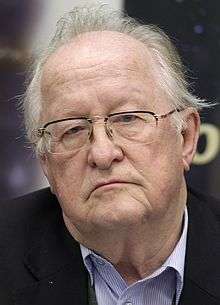Viktor Gerashchenko
Viktor Vladimirovich Gerashchenko (Russian: Ви́ктор Влади́мирович Гера́щенко), nicknamed Gerakl (the Russian version of Heracles), was the Chairman of the Soviet central bank and then Russian Central Bank during much of the Perestroika and post-Perestroika periods.

Biography
Viktor Gerashchenko was born in Leningrad on 21 December 1937. His father was a leading Soviet banker who ran the Financial Department of the Foreign Office in the 1940s before ending his career as Deputy Chairman of the Central Bank. Due to his father's connections, Viktor made a brilliant career in the Soviet banking system. At the age of 28 he became Director of the first Soviet bank abroad, Moscow Narodny Bank, based in London.
In 1982 Gerashcheko moved to work in the Vneshtorgbank, responsible for the Soviet foreign trade. Seven years later he was appointed Chairman of the Board of the USSR State Bank. In 1991, Gerashchenko became the last Chairman of the State Bank of the USSR. For three years, which proved to be some of the most difficult for the Russian national economics, he steered the nascent banking system as Chairman of the Bank of Russia.
His activities as Central Bank chair were controversial: for example, he was accused of illegally supplying money to the anti-reform forces in the Supreme Soviet during the 1993 Russian Constitutional Crisis. Gerashchenko has also been accused of being largely responsible for the Russian "Black Tuesday" of October 1994, when the Russian ruble crashed 24 percent in one day. In fact, former Harvard Economist Jeffrey Sachs in 1995 called Gerashchenko "the worst central banker in the world." [1]
Gerashchenko laid down his offices in 1994 but returned to the office following the 1998 Russian financial crisis. Under his leadership, the economy of Russia rapidly recovered after the excruciating default. Gerashchenko made frequent TV appearances and became quite popular for his sardonic, dry sense of humor.
In March 2002 Gerashchenko resigned again, citing his advanced age, and accepted the post of Chairman of the Board in the notorious oil company Yukos. He then joined the Rodina party as a co-chairman and made it to the State Duma as their representative.[2]
Presidential candidacies
2004
Gerashchenko ran in the 2004 Russian presidential election.
He was originally believed to have been acting as a back-up candidate to Rodina leader Sergey Glazyev, in case something were to prevent Glazyev from running.[3] However, a divide between Glazeyev and Geraschchenko became apparent when Rodina nominated Geraschchenko for president instead of Glazyev.[4]
Geraschenko was ultimately refused registration by the Central Election Commission due to a technicality.[4] The Supreme Court upheld his disqualification.[4]
2008
Four years later he considered running as an opposition candidate in the 2008 Russian Presidential election.[5]
Honours and awards
- Order of Merit for the Fatherland, 3rd class
- Order of Honour
- Order of the Red Banner of Labour
- Order of Friendship of Peoples
- Medal "For Labour Valour"
- Jubilee Medal "In Commemoration of the 100th Anniversary since the Birth of Vladimir Il'ich Lenin"
- Jubilee Medal "300 Years of the Russian Navy"
- Medal "In Commemoration of the 850th Anniversary of Moscow"
References
| Wikimedia Commons has media related to Viktor Gerashchenko. |
- "Who's Who in Primakov's New Russian Government". 21 February 2006.
- "Лента новостей". www.afn.by.
- "RUSSIAN ELECTION WATCH Vol.3, No.4," (PDF). www.belfercenter.org. Harvard University (Belfer Center for Science & International Affairs, Davis Center for Russian & Eurasian Studies) and Indiana University-Bloomington. January 2004. Retrieved October 29, 2018.
- "RUSSIAN ELECTION WATCH Vol.3, No.5," (PDF). www.belfercenter.org. Harvard University (Belfer Center for Science & International Affairs, Davis Center for Russian & Eurasian Studies) and Indiana University-Bloomington. February 2004. Retrieved October 29, 2018.
- "Документ не найден". 25 May 2011.